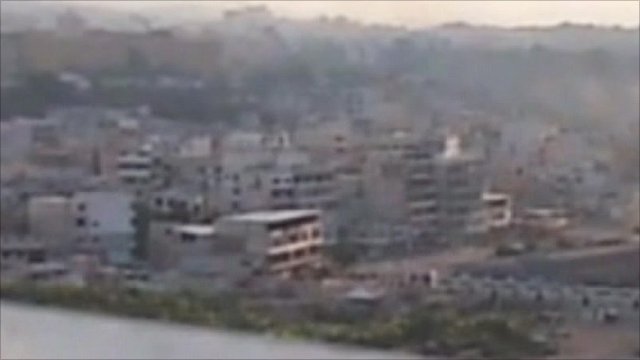 Renewed heavy gunfire is reported in the Syrian port city of Latakia as a military crackdown on unrest entered a third day.
Renewed heavy gunfire is reported in the Syrian port city of Latakia as a military crackdown on unrest entered a third day.
Activists say 27 people have died and that residents trying to flee the Ramel district, including women and children, have been fired on by troops.
The government says it is tackling armed terrorist gangs.
More than 1,700 people have reportedly died in the six-month uprising against the rule of President Bashar al-Assad.
'Shooting is intense'
The Ramel quarter and neighbouring areas are said to be under constant heavy gunfire as tanks and troops move through the streets.
The assault began on Saturday, a day after mass anti-government protests in the city.
On Sunday activists said Syrian warships had joined the attack, firing shells on the city.
One resident of Ramel told Associated Press news agency: "We are being targeted from the ground and the sea. The shooting is intense. We cannot go out. They are raiding and breaking into people's homes."
He said that at least three gunboats were taking part and mosques had been targeted.
A UK-based Anglican priest who is visiting his family in Latakia said the atmosphere in the city was extremely tense.
"[On Sunday] you could hear a lot of shooting and bombing from different parts of the city," the Reverend Nadim Nassar told the BBC. "The whole city is now shut... the fear is very high and people don't know what's going on and what is next," he said.
The London-based Syrian Observatory for Human Rights said at least one young child had been killed.
State television denied any shelling had happened.
It said the security forces were fighting armed gangs who had set up barricades and were shooting from rooftops.
The government said three members of the security forces were killed and 40 wounded in clashes. It interviewed some of the city's residents in other places who called on the army to clear out the "terrorist gangs".
Activists deny that their movement is armed but said at least one officer and a number of soldiers had defected to join the uprising.
International journalists face severe restrictions in operating in Syria, and it is hard to verify reports.
Latakia has seen many anti-government protests in the past six months.
Syria has come under increased diplomatic pressure in the past week to stop its crackdown on the dissent.
The US has imposed sanctions on Damascus and has said these could be increased, while calling on other countries to follow.
Saudi Arabia, Bahrain and Kuwait have all recalled their ambassadors, while Turkish Foreign Minister Ahmet Davutoglu has described the methods used by the Syrian security forces as "unacceptable".
Mr Assad has reiterated promises of political reform, while remaining adamant his government would continue to pursue the "terrorist groups" he has blamed for the unrest.
Protests have been targeted in Homs, Hama, Damascus, Deir al-Zour in the east, Deraa in the south and Aleppo and Idlib near Turkey's border.
A doctor in Hama told the BBC that medical services there had been severely affected by recent government attacks. He said two hospitals were closed and one had been stormed by troops, injuring many of the medical staff.



